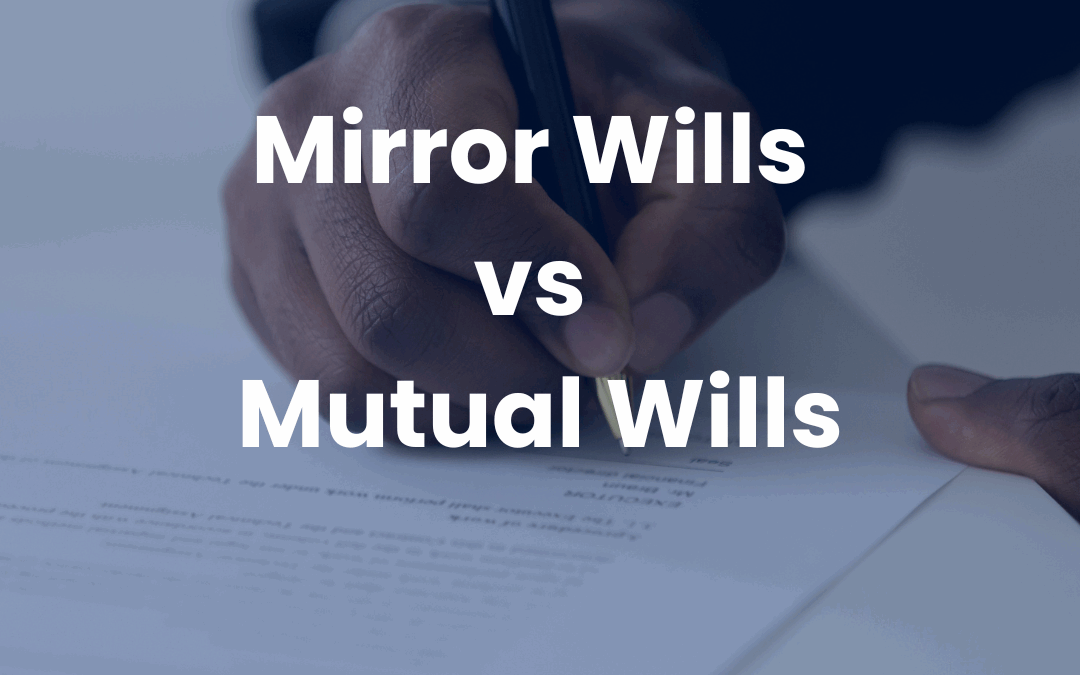It is often believed that Mutual Wills and Mirror Wills are the same thing. But legally, they are very different and should not be confused.
In both cases, they are made by couples who have similar wishes – usually this is leaving everything to each other and then to the children. In this way, the Wills “mirror” each other. But following the first death, it is important to consider whether the survivor can decide not to honour the other’s wishes.
What are Mirror Wills?
Mirror Wills reflect the contents of another Will, hence the title ‘mirror’, so there are essentially 2 almost-identical Wills that state what will happen to the other (and their children) in the event of a death.
The main ways in which they can differ is, of course, the name of the testator (the person who has written the Will) and any specific funeral requests.
Generally, a couple may wish to get a Mirror Will if they want the following to happen in the event of their passing:
If one partner dies, the other partner will be entitled to the deceased partner’s entire estate (depending on first death).
When the remaining partner passes away, the estate will be passed on to any children.
Instead of getting two separate Wills that basically state the same requests, a Mirror Will is a more cost-effective option for couples if they both want the same things.
A Mirror Will is a good way of making sure your estate remains within your blood-related family.
What are Mutual Wills?
Mutual Wills go one step further than Mirror Wills, creating a legally binding agreement between a couple that the survivor will not change their Will.
A factor that can make this complicated is that there may be no written indication of such an agreement, either in the Wills or elsewhere. Nevertheless, if there is clear and convincing evidence of a binding intention between the couple that neither of them is entitled to change their Will without the other’s consent, they will have created mutual Wills.
A factor that seems at odds with this principle is that Wills in themselves cannot be made irrevocable. And should the survivor remarry, the earlier Will is automatically revoked.
However, if the first party dies having honoured their side of the agreement, equity comes into play, imposing a constructive trust over the property to which the agreement relates, on behalf of the agreed beneficiary/ies. The survivor is free to deal with the property during their lifetime, but they cannot give it away.
We have a lot of useful information on our wills & trusts page here
A case study
An excellent illustration of a situation where the terms of a Mutual Will were upheld, was the case of Legg v Burton.
Mr and Mrs Clark made their Wills in July 2000, and they mutually agreed to leave everything to the survivor of themselves and then, on the survivor’s death, equally to their two daughters – Ann and Lynn.
At the time of making their Wills, Mr and Mrs Clark made a verbal promise to each other that they would never change the terms. As the Judge in the case heard, they wanted this agreement to be “set in stone.”
Ann and Lynn were with their parents when they made their Wills and after the solicitor had left, they questioned their parents on what would happen if either of them changed their mind after the other had died. They were reassured by both parents that this would not happen as they had already made a promise to each other.
The following year, Mr Clark died. Initially, Mrs Clark relied heavily on her daughters. But after a while, changing circumstances meant that Mrs Clark relied increasingly more on her grandsons and the partner of one of them.
As a result, in the years following her husband’s death, Mrs Clark made 13 new Wills – each progressively leaving more of her estate to her grandsons and the partner, and less to Ann and Lynn.
When Mrs Clark died in 2016, her last Will left only small cash gifts to her daughters. Ann and Lynn claimed that the Will made in July 2000 should be upheld.
At trial, the Judge found that the verbal promise made between Mr and Mrs Clark in July 2000 had created a legally binding agreement – mutual Wills – which rendered invalid all of the subsequent Wills made by Mrs Clark.
You can read more about this case here
Caution required
When a couple makes their Wills, binding each other may seem like a good idea. But there are circumstances where it may be beneficial for the survivor to have the flexibility to make changes.
A matter to consider is that people are generally not good at reviewing their Wills, even following major life events or significant changes in circumstances.
Understandably, we do not like to dwell on our mortality, and after we have gone to the effort of making our Will, there is a tendency to think it has been done and can be forgotten about.
When people are reviewing their Wills, maybe many years after making them, both parties to mutual Wills may agree it is a good idea to change the terms. However, once one of them dies, that opportunity is lost and the agreement binds the survivor.
You should always take advice before seeking to create mutual Wills. It may well be that there is another legal mechanism to achieve the same or a similar result to the one you are both seeking while still allowing the survivor the flexibility to change their Will to adjust to new circumstances.
It is vital that you have a will arranged, please contact us today to arrange a free chat.
Linked services: Lasting Powers of Attorney, Probate

